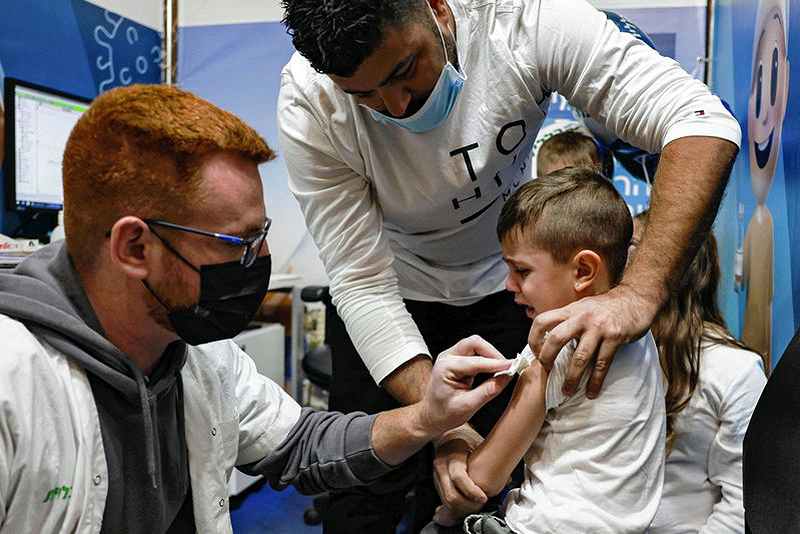
An Israeli health worker wipes the arm of a five-year-old child after administering a dose of the Pfizer / BioNTech COVID-19 vaccine at Clalit Health Services in Jerusalem on Nov. 23.
December 8, 2021
The Health, Labor and Welfare Ministry is currently discussing whether to expand the COVID-19 vaccine campaign to include children aged 5 to 11, but opinions are divided over such factors as infection risks and the impact on development, among other issues.
A ministry subcommittee, comprising experts on pediatric medicine and infectious diseases, and local government officials, held a meeting to discuss the issue on Nov. 15, during which some members said children should have the opportunity to get vaccinated, while others urged caution.
U.S. pharmaceutical giant Pfizer Inc. is seeking approval for its vaccine to be administered to children aged 5-11 in Japan.
In clinical trials, one-third of the conventional dose produced neutralizing antibodies equivalent to the amount in vaccinated adults. The trials also showed a 90.7% effectiveness in preventing the disease and no significant difference in adverse reactions compared with adults.
The health ministry wants to start vaccinating children in this age group as early as next February.
Although there have been no major objections among subcommittee members regarding the expansion of the target age group, the biggest point of contention is whether the government should stipulate that there is an “obligation to make an effort” to get young children vaccinated. Everybody over the age of 11, excluding pregnant women, is legally obliged to make an effort to be vaccinated against COVID-19.
Of the about 18,000 people who had died of COVID-19 in Japan as of November, three were aged 10-19; none was under 10 years old.
Most of the children who were infected with coronavirus had mild symptoms. However, as the virus spreads, the number of people who become seriously ill will also increase. According to data compiled in the United States, as of October, about 8,300 patients aged 5-11 had been hospitalized, and 146 had died.
The United States and Israel have approved vaccinations for children aged 5 and above and similar measures are being mulled in Europe.
If Japan strongly urges vaccinations for children, it will be easier to communicate the risk of infection and the need for inoculation.
“If a major outbreak occurs, even children need to be on their guard,” said subcommittee member Takashi Nakano, a professor at Kawasaki Medical School. “There would be restrictions on their school lives, and it would affect their learning and development,” he said, stressing that everyone deserves a fair chance to get vaccinated.
Unexpected reactions to vaccines are a concern.
More than 2,000 children took part in Pfizer’s clinical trials, but it would have been difficult to identify the risk of such rare reactions as myocarditis.
If the government strongly urges vaccinations for this age group, unvaccinated children might feel pressured to get inoculated by people around them.
Hiroyuki Moriuchi, professor at Nagasaki University, said, “There should be no rush to vaccinate healthy children until data from other countries can be gathered, after which decisions can be made on an individual basis.”
Vaccination vouchers have been distributed for all children 12 and older. The subcommittee is discussing whether this should also be the case for the 5-11 age group or whether recommendations should only be made for children with preexisting conditions who are likely to develop serious symptoms if they are infected.
“There are differences between Japan and foreign countries in the overall rate of vaccination and the health care environment for children,” said Atsuo Hamada, a specially appointed professor at Tokyo Medical University. “It is important to scientifically discuss the extent to which we should actively recommend vaccinations and determine Japan’s own vaccination policy.”
Children under the age of 16 need the consent of their guardians to be vaccinated.
Vaccine uncertainty among some parents has been attributed to the fact there have only been a few cases of serious illness among children who have contracted COVID-19.
Opinions were divided among children and parents according to a survey conducted by the National Center for Child Health and Development in September.
Of 872 elementary school children who responded to the survey, about half of them said they want to get vaccinated as soon as jabs for children are approved while 40% said they did not want to.
“I’m afraid of getting a fever,” one pupil said.
About 70% of parents said they want their children to get vaccinated.
However, a parent who was unsure about vaccinations for young children said, “The side effects may outweigh the benefits.”
Mayumi Hangai, a co-researcher at the center who was in charge of the survey, said, “It’s important to communicate the advantages and disadvantages of vaccination in an easy-to-understand manner, taking into consideration the age and developmental stage of the child.”
Top Articles in Society
-

Man Infected with Measles Reportedly Dined at Restaurant in Tokyo Station
-

Man Infected with Measles May Have Come in Contact with Many People in Tokyo, Went to Store, Restaurant Around When Symptoms Emerged
-

Woman with Measles Visited Hospital in Tokyo Multiple Times Before Being Diagnosed with Disease
-

Australian Woman Dies After Mishap on Ski Lift in Nagano Prefecture
-

Foreign Snowboarder in Serious Condition After Hanging in Midair from Chairlift in Nagano Prefecture
JN ACCESS RANKING
-

Japan PM Takaichi’s Cabinet Resigns en Masse
-

Japan Institute to Use Domestic Commercial Optical Lattice Clock to Set Japan Standard Time
-

Israeli Ambassador to Japan Speaks about Japan’s Role in the Reconstruction of Gaza
-

Man Infected with Measles Reportedly Dined at Restaurant in Tokyo Station
-

Videos Plagiarized, Reposted with False Subtitles Claiming ‘Ryukyu Belongs to China’; Anti-China False Information Also Posted in Japan





















